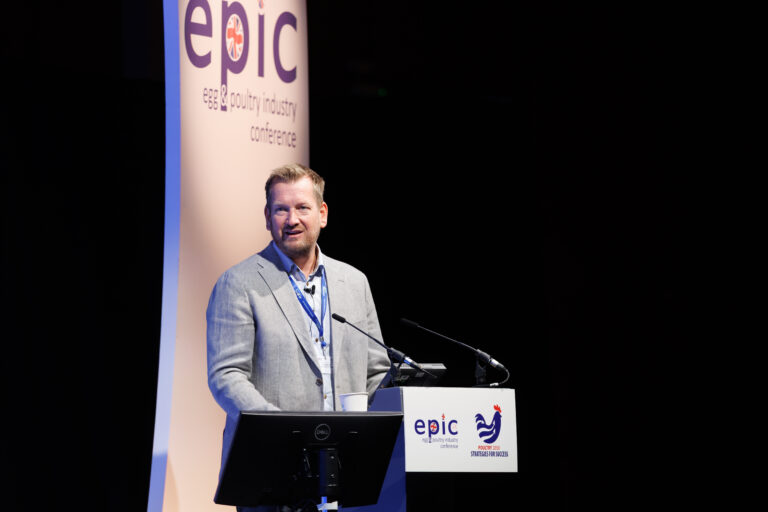Norsk Kylling is the only European company fully compliant with the Better Chicken Commitment. Tor Inge Lien, veterinarian and director of production and animal welfare told EPIC delegates about the company’s journey to the BCC.
Lien began by setting the Norwegian context. “We are only five million people,” he said. “All the yearly volume from our chicken production could be produced in one month here in the UK. So, it’s quite different.”
Only 2% of Norway’s land is suitable for agriculture, and farmers are legally protected as the exclusive producers of food. Norsk Kylling therefore operates through 142 independent farms to produce around 50 million chickens annually. “We as a company cannot produce any chicken ourselves,” Lien explained. “We depend on our farmers, and that’s how the system is built.”
The company is vertically integrated through its parent, Rema 1000, one of Norway’s largest retailers. “We own the hatcheries, the processing plant, and we are owned by the retailer,” said Lien. “That gives us control and responsibility for every step.”
Trust, transparency, and attitude
Lien described how openness and trust have become central to Norsk Kylling’s culture. “When I started 11 years ago, we were considered the worst poultry company in Norway,” he admitted. After an NGO inspection produced a 90-page critique, Lien’s first reaction was disbelief. But his chief executive encouraged him to use it constructively.
“He told me, ‘I trust you and your team. Use this report as a roadmap to make changes faster than you would have without it.’ That changed everything,” Lien said.
Since then, Norsk Kylling has invited NGOs, regulators, and researchers into its facilities. “It’s not dangerous to show what you’re doing if you trust your people,” he added. In 2023, after a decade of collaboration and reform, the same NGOs that once criticised the company gave Norsk Kylling a ‘green light’ rating for all production.
From fast to slow
One of the company’s most transformative decisions came in 2018, when Norsk Kylling switched entirely to Hubbard, a slower-growing chicken breed. “The farmers are happier, the new generation wants to take over the farms, and the numbers are better,” Lien said.
The change enabled Norsk Kylling to become the first large-scale producer in Europe to meet the European Chicken Commitment (ECC) or Better Chicken Commitment, a which requies natural light, enrichment, lower stocking densities, and independent auditing.
“It’s so much easier to be transparent with this breed,” Lien explained. “The chickens live healthier lives, and it’s something our customers and farmers can be proud of.”
Eliminating antibiotics
Lien recounted how Norsk Kylling’s approach to antibiotics changed after a 2014 report revealed ESBL-resistant bacteria in Norwegian chickens. “One doctor went on TV and said she hadn’t eaten chicken for six months,” Lien said. “Sales dropped 25% overnight.”
The company responded by eliminating antibiotic use entirely. “Everyone told us it wouldn’t work,” he said. “But it did. Our results are better than ever.”
Norsk Kylling also invested in a state-of-the-art hatchery, opened in 2023. “The chicks have immediate access to feed and water after hatching,” Lien said. “We even have a window so visitors can look into the hatchery. It’s not dangerous to show what we do.”
Sustainability, Lien emphasised, is measured across the entire chain. Norsk Kylling tracks CO₂ emissions monthly, with targets for 2030 and 2050. A new processing plant powered entirely by renewable energy, featuring heat recovery, seawater cooling, and solar panels, has already cut emissions by 88%.
However, most emissions now come from feed and manure. “We want to quit soy by 2030,” Lien said. “We’re already down to 9% soy use and are working on local protein sources from the Norwegian coast.”
He also revealed a partnership exploring alternative feed ingredients and circular-economy solutions. “If we want to change fast, we need to work with everyone- researchers, feed mills, and farmers,” he said.
Future Technology
Lien stressed that sustainability improvements must also make economic sense for farmers. “You can’t do any changes without them being happy,” he said. “When we reduce density or change feed, they are compensated. The farmer’s income is stable, and that’s why they follow us.”
Norsk Kylling is also piloting AI-based inspection technology at its processing plant. “We’re working with a camera system that can automatically detect carcass quality,” Lien revealed. “We hope by 2050 to have fully automated inspection and even automatic hanging of chickens.”
Transparency remains a cornerstone of Norsk Kylling’s identity. The company hosts more than 3,000 visitors a year at its farms, hatcheries, and processing sites. “We’re not afraid of hidden cameras,” Lien said. “We should behave as if we’re filmed everywhere. It’s not dangerous if you’re doing things right.”


